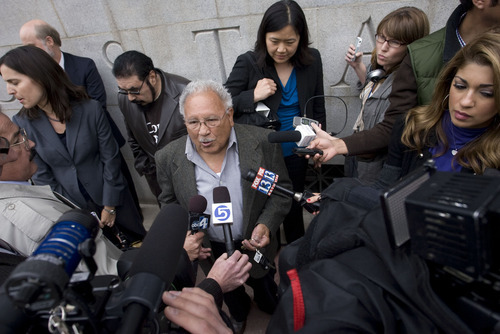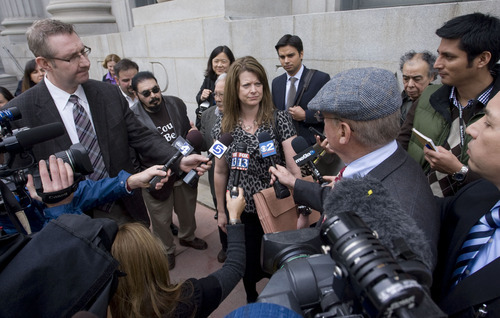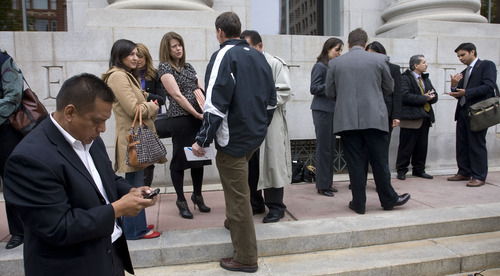This is an archived article that was published on sltrib.com in 2011, and information in the article may be outdated. It is provided only for personal research purposes and may not be reprinted.
Utah's enforcement-only immigration law was on the books for less than 15 hours before a federal judge blocked it from being enforced Tuesday afternoon during a hearing that took less than an hour.
U.S. District Judge Clark Waddoups issued the temporary restraining order after the lawyer for the state couldn't argue that there wouldn't be "irreparable harm" to people if the law remained in effect.
Attorneys for the state and the civil-rights groups that brought the lawsuit seeking a preliminary injunction will argue the case for a preliminary injunction before the judge July 14.
The law, HB497, was sponsored by Rep. Stephen Sandstrom, R-Orem, and took effect midnight Tuesday. It was modeled after Arizona's enforcement-only law signed more than a year ago by Gov. Jan Brewer. Jerrold Jensen, Utah assistant attorney general, argued in court, however, that lawyers for the American Civil Liberties Union and the National Immigration Law Center were arguing the wrong state's law.
"What they want to do is argue the Arizona case all over again," Jensen said.
But Darcy Goddard, an attorney for the ACLU of Utah, said Utah's law only made "cosmetic" changes to what existed in Arizona. She said the Utah law violates the federal supremacy clause, the constitutional protections against unlawful search and seizure and the right of people to travel freely.
When Waddoups asked Jensen if the ACLU had made sufficient arguments to show that by having the law in effect it would cause irreparable harm to people in Utah, Jensen didn't put up much of a fight.
"I guess," he said.
"I'll take that," Waddoups replied.
Jensen said he was confident the law would hold up when it goes to trial in July.
"I think it's absolutely constitutional, and we will defend it vigorously," he said.
He said the Utah law is different than Arizona's in several instances, namely that Arizona's version required local police to arrest and detain those who couldn't prove legal status in the United States. Jensen said HB497 has no such provision to detain those suspected of being in the country illegally.
Arizona's law also required local police to check the legal status of a group of people — even if only one was suspected of committing a crime. But Sandstrom's bill was written to allow a check of legal status of a group only if a police officer suspects the individuals are victims of human trafficking.
Goddard said, however, that portion of the law, as written, could be broadly interpreted by any police officer to require checking status on any crime and that groups of people could be targeted by using racial profiling. Both of those parts of SB1070 were struck down by a federal judge in lawsuits filed against Arizona by the U.S. Department of Justice. The Justice Department is not a participant in the lawsuits against Utah. Jensen argued the federal government was the only party that had legal standing to file a lawsuit to try to stop HB497.
The ACLU also took issue with the law's allowable forms of identification, saying the provision that only accepts driver licenses issued after January 2010 puts everyone at risk.
"Like Arizona's SB1070, the Utah law violates the Constitution and is even worse in requiring all Utahns to carry their 'papers' at all times to prove they are lawfully present," Goddard said. "Wherever civil liberties are threatened, be it in Utah, Arizona or elsewhere, we will continue to challenge unconstitutional laws like these."
Gov. Gary Herbert, who is named in the lawsuit, issued a statement after the ruling.
"Utah's attorney general and state Legislature worked hard to craft a bill that would withstand constitutional scrutiny," he said. "Utah will have ample opportunity in court to demonstrate this bill is on solid footing."
Sandstrom, who underwent surgery to put stents in his left coronary artery Tuesday and missed the hearing, said from the hospital that he found the ACLU's argument — that HB497 was worse than Arizona's law — "silly" after many changes were made.
"I'm disappointed but not surprised that the court would issue a temporary restraining order," Sandstrom said. "But I believe it will hold up at the hearing in July."
Daniel Argueta of the Brown Berets, a Latino-rights activist group, called the ruling "a victory, for now. … Hopefully, with this result, people will calm down and realize that we still have a long way to go."
dmontero@sltrib.comTwitter: @davemontero —
Utah's law
Civil rights groups • The ACLU and others suing Utah over the immigration-enforcement law argue that it would lead to racial profiling, would require all Utahns to carry identification "papers" and is unconstitutional.
State attorneys • The Utah Attorney General's Office contends lawmakers went to great lengths to avoid provisions in Arizona's immigration law that have been thrown out by a federal judge. They will counter the plaintiffs point by point in weeks to come.
Court ruling • The temporary restraining order issued Tuesday stays the law from being enforced at least until a hearing on a requested preliminary injunction is held July 14.













